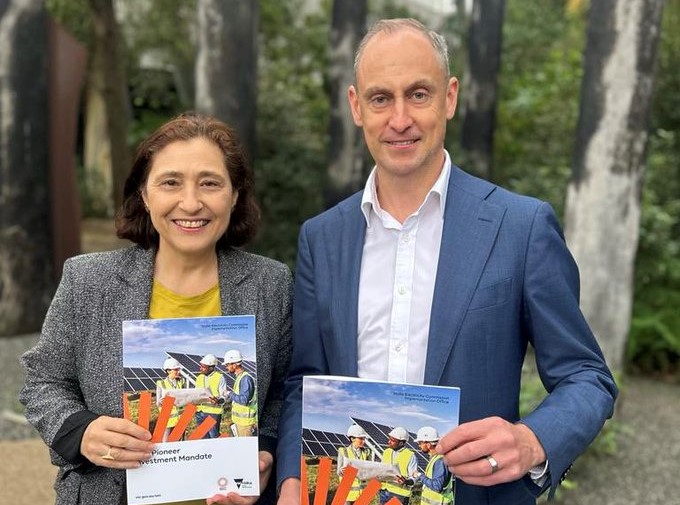Victoria’s treasurer Tim Pallas has released the state’s new budget, delivering on the promise made in April to allocate $1 billion towards the freshly revived State Electricity Commission (SEC), which is aiming to re-establish government-owned energy and eventually operate 4.5 GW of renewable energy generation and storage projects in the state.
The Victorian Budget 2023/24 also includes substantial funding for clean energy education, with $50 million for a TAFE Clean Energy Fund, $116 million for six new Tech Schools and a Clean Energy Equipment Fund, as well as $19 million for work experience placements in the clean energy sector for 10,000 students.
“Since Victoria’s energy was privatised, we’ve experienced a chronic shortage of workers in trades,” the government’s announcement says. “Our SEC will help find and train the next generation of tradespeople: maintenance workers, lineys, electricians – but also welders, painters and mechanics.”
“We’ll invest $12 million to develop new VET [vocational education and training] qualifications, fund a business case for the SEC Centre of Training Excellence and deliver on the Victorian Energy Jobs Plan to map out the jobs needed and prepare the workforce to get those jobs done.”
The government is also investing $10 million in a Hydrogen Energy Worker Training Centre, $6 million for a Wind Worker Training Centre and $20 million to realise the state target of 75% – 80% emission reductions by 2035.
In terms of transmission, $20.6 million will go towards government entity VicGrid’s planning and community consultation. Given the recent commotion around the major VNI West project, additional community consultation appears vital.
On top of commonwealth funds and commitments, the Victorian government is putting $58.2 million towards installing 100 new neighbourhood batteries “at targeted locations across Victoria.” This funding, it says, will triple the number of homes with access to a battery and providing crucial extra storage capacity for local communities. The Victorian government also has an interest-free loan program for household batteries.
To support the state’s resources sector “and renewable energy agenda,” $23.2 million will go towards streamlining and reforming the approval processes for minerals projects, including the critical battery minerals sector which is surging particularly in Western Australia and Queensland.
The government has also provided $2 billion for its ‘Breakthrough Victoria’ initiative, which identifies five “future-focused” industries: the ‘clean economy,’ advanced manufacturing, agri-food, digital technologies, and health and life sciences.
Looking at the budget, it seems advanced manufacturing largely refers to medical manufacturing. Despite its significant funds, the budget doesn’t include a huge amount of information on the Breakthrough Victoria initiative, which appears to be an avenue for the government to invest in clean technology innovations. What it does say is a further $21 million will go towards providing support for businesses wanting to access the Commonwealth’s $15 billion National Reconstruction Fund – of which renewables and low emissions technologies are a key focus.
The Victorian government has also allocated $15 million to its Industry R&D Infrastructure Fund which will incentivise private industry investment into research and development in the clean economy space.
Smart Energy Commission (SEC)
The commission is really the centrepiece of the government’s clean energy funding. On top of the $1 billion seed funding, Victoria’s government has provided $44 million to prepare SEC for ‘its presence,” presumably offices, in Morwell and Melbourne.
SEC will become an active energy market participant in Victoria, working with industry to invest in and speed up the delivery of renewable energy and accelerate the energy transition.
In April, Energy Minister Lily D’Ambrosio launched SEC’s Pioneer Investment Mandate which includes the project criteria and process for the commission’s first investment. The successful project resulting from this process is expected to be announced before the end of 2023.
It is anticipated the state will retain a 51% stake in its renewable energy projects alongside “like-minded entities,” such as industry super funds, the preferred investors for the remaining share.
This content is protected by copyright and may not be reused. If you want to cooperate with us and would like to reuse some of our content, please contact: editors@pv-magazine.com.









By submitting this form you agree to pv magazine using your data for the purposes of publishing your comment.
Your personal data will only be disclosed or otherwise transmitted to third parties for the purposes of spam filtering or if this is necessary for technical maintenance of the website. Any other transfer to third parties will not take place unless this is justified on the basis of applicable data protection regulations or if pv magazine is legally obliged to do so.
You may revoke this consent at any time with effect for the future, in which case your personal data will be deleted immediately. Otherwise, your data will be deleted if pv magazine has processed your request or the purpose of data storage is fulfilled.
Further information on data privacy can be found in our Data Protection Policy.